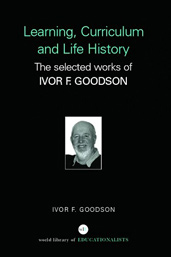Learning, Curriculum and Life Politics: the selected works of Ivor F. Goodson
Nations at Risk
The National Curriculum and National Identity
The national curriculum has been initiated with pronouncements casting national regeneration in terms of links to the economy, industry and commerce, in particular the so-called 'wealth creating' sector. Yet in practice the balance of subjects in the national curriculum suggest that questions of national identity and control have been pre-eminent, rather than industrial or commercial requirements. For example, information technology has been largely omitted, whilst history has been embraced as a 'foundation subject', even though it is quite clearly a subject in decline within the schools.
The reasons for favouring history whilst omitting more commercially 'relevant' subjects are intriguing. On the face of it, this pattern of prioritizing might seem encouraging: sponsoring liberal education and humanist study over more narrow utilitarian concerns, favouring education over training. Regrettably this does not seem to be the case. History has, I believe, been chosen to revive and refocus national identity and ideology.
The recent National Curriculum History Group Interim Report provides information on the new curriculum proposals for school history. Firstly the report confirms that prior to the revival initiated by the incorporation in the national curriculum, history was a subject in decline: 'It now has a tenuous place in the primary curriculum and it is under threat in a growing number of secondary schools, both in terms of the number of pupils taking it, and as a coherent, rigorous and free-standing course of study' (Times Educational Supplement). One of the reasons for the progressive decline of history has been the growth of social studies and sociology. The latter subject is a very popular examination subject, but has been omitted in the national curriculum in favour of reviving history. The questions therefore remain as to why has history been so favoured.
The Interim Report provides some evidence on this issue for the national curriculum in history will have some distinctive features. At the core will be UK history which overall will take up 40% of the timetable. 'This figure, however, is slightly misleading because children at key stage one infant level will study UK history almost exclusively, while pupils in the early years of the secondary school will study it as a core subject for just one-third of the time earmarked for history' (Times Educational Supplement). The focus of the national curriculum on British history in the formative early years of schooling indicates a wish to inculcate at an early stage a sense of national identity. This desire for a major and increased UK dimension in history has plainly come from within the Government. We are told for instance that:
The issue which has hitherto aroused the most controversy is the Minister's insistence that the group should increase the proportion of British history for secondary pupils. At the moment, the group is planning to devote only one-third of the syllabus to British history as a compulsory subject for 11 to 14-year-olds. This figure rises slightly to two-fifths for 14 to 16-year-olds. Mr. MacGregor wants British history to be taught for at least 50% of the time devoted to history in secondary schools (Times Educational Supplement).
